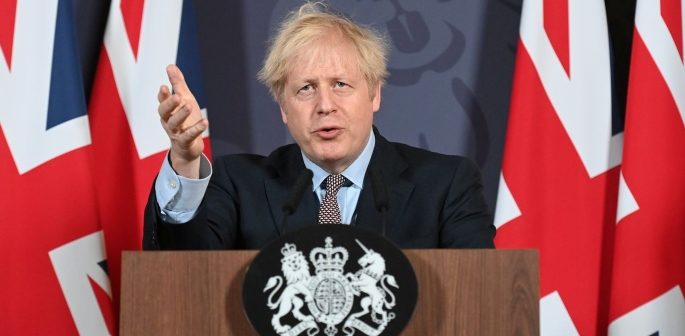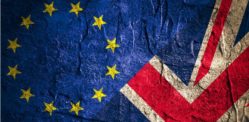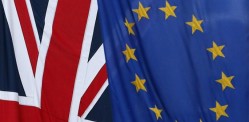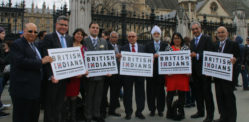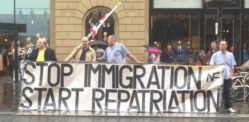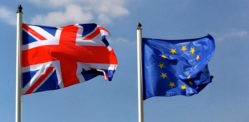UK nationals will no longer have the freedom to live, study, work in the EU
The UK and the EU finalised their trade and security deal, the largest bilateral trade pact in history, on December 24, 2020.
It hasn’t been published in full but the 2000 worded initial document gives us an insight into what the agreement holds.
It will only become enforceable after the two parties approve it. We will get to know more about the developments in the coming days.
The agreement looks highly comprehensive and includes wide-ranging elements like tariffs, fisheries, data protection and much more.
The Brexit deal is going to impact people and businesses all across Europe and the UK.
Therefore, it is important for you to know what repercussions the deal will have on people’s everyday lives.
Here’s a look at the different elements in the agreement.
Trade
The previously trusted trade programmes will remain in place, meaning- producers in the UK will have to adhere to both EU and UK standards.
Professional Qualifications
The old practice of giving automatic recognition to doctors, nurses, dentists, pharmacists, vets, engineers, architects will cease to exist.
They will have to seek permission from the member state they want to work in.
Mobility
UK nationals will no longer have the freedom to live, study, work or start a business in the EU.
People who wish to stay in the EU for more than 90 days would need to get a Visa.
However, coordination in some social security benefits (such as old-age pensions and healthcare) will be allowed.
This would help people to work abroad and not lose any contributions already made to National Insurance.
Tariffs
There will be tariff-free and quota-free access to one of the world’s most significant markets.
It will surpass the deals that the EU has with Canada and Japan.
Fisheries
The UK will not be part of the common fisheries policy.
The EU’s annual fishing turnover from the UK waters is around €650m, while the UK’s fishing vessels receive €850m.
There will be a change in the old quotas as the new quotas will reduce the EU’s share by 25%. This will continue till 2026.
By the end of this period, a quarter of the EU’s catch (valuing €162.5m a year ) will be sent back to the UK’s vessels.
At present, the EU vessels are allowed to fish six to 12 nautical miles from the British coastline.
After the transition period, there will be yearly negotiations regarding access to the waters and the quantity of fish caught by each party.
Both sides will require to give a three-month notice if they want to restrict or close access to their waters.
If the access is denied to one side, the other side can seek compensation or apply tariffs in certain proportions.
State Aid
The EU had contended that the UK should align with its state aid rules.
Brussels was wary that the UK might seek competitive advantage through subsidies.
However, Downing Street managed to successfully reject the idea.
The UK will establish its own subsidy regime. A new designated domestic enforcement body will make decisions over subsidies.
This body will decide if the state aid creates problems for the trade after the subsidy has been awarded.
This is a major leeway given by the EU to the UK.
However, the UK’s new subsidy regime is required to respect the key principles embedded in the agreement.
If in any case, the domestic enforcement body fails to respect these principles, both parties can resort to remedial measures.
Origin of Goods
This agreement defines what goods would be called “made in Britain”.
UK has asked that EU materials should be labelled as British goods when the finished products are exported into the European market.
A tariff decided under the agreement would only be applied to a product if more than 40% of its value (before finishing) wasn’t British origin or from a non-EU country such as Japan.
This is going to give rise to a lot of fresh paperwork and procedures for businesses to understand within a short period of time.
However, the UK was unable to obtain diagonal accumulation.
Because of this, materials from countries like Turkey and Japan, which have trade agreements with the UK and the EU, can’t be labelled as British input.
In a separate agreement, the EU gave the UK third-country listing, provided the UK meets the necessary conditions.
The conditions are animal health and biosecurity standard checks. They are required before exporting live animals and animal products to the EU.
Standards/Retaliation
A minimum level of social, environmental and labour standards has been established that both sides will need to maintain.
Ursula von der Leyen, President of the European Commission, has stated that a review would take place after every four years to ensure that the level playing field is intact and working.
According to Downing street, the EU insisted on an “evolution clause”, or an “equivalence mechanism”.
If accepted, this would have allowed the EU to apply tariffs on UK goods without reciprocation if the standards downgraded over time.
If any side raised or changed these standards, the other would have to do the same or face consequences.
In the end, both parties came to a conclusion, which is closer to the UK’s objectives than that of the EU.
Downing Street has asked for a reconsideration option for the future where both parties can decide on upgrading the standards.
The final outcome has a review or “rebalancing” clause, which will allow the sides to start a formal review of the set standards and other economic parts of the agreement.
If either side insists on introducing new standards, the other side is allowed to apply tariffs.
These tariffs will be decided by an independent arbitration panel.
Dispute Resolution
It was one of the most crucial and difficult areas to be negotiated because any rules established would govern trade-related disputes for many years to come.
The EU had raised concerns over the UK’s ability to stray from the EU standards in the future.
They were afraid that the UK might secure a big competitive advantage over this and become a “Singapore on Thames”.
Now, if either side feels the trade is being manipulated, they can take appropriate action after discussion.
An arbitrage panel would be established that will meet within 30 days and adjudicate over the dispute.
If the measures or the action turn out to be excessive or inaccurate, the discontented side can ask for appropriate compensation.
In all probability, an overlooking governance body, consisting of subcommittees, will be established to implement the treaty.
Science
The UK has agreed to become a paying associate member of the EU’s flagship €80bn Horizon Europe programme for seven years.
It will also continue to participate in Copernicus and Euratom.
Transport
Under the deal, aviation and haulage will continue like before.
Passenger and cargo planes will still be able to fly and land in the EU.
This would include stopover flights from Heathrow and elsewhere in the UK that originate from outside the UK.
Hauliers can continue to drive without special permits, although they are provided in limited numbers, to countries outside the EU.
This is good news for people in the logistics industry who could’ve been locked out in huge numbers if this wasn’t agreed upon.
This agreement was made on the condition that the UK will remain a member of the European Common Aviation Area.
However, in a temporary agreement and will be renegotiated in the immediate future.
Erasmus
The UK has backed out of the university exchange programme.
UK rejected the programme because the EU wanted them to be on a seven-year payment plan in order to become an associate member.
However, the Irish government confirmed on December 24, 2020, that Northern Ireland students can continue to be a part of Erasmus.
The Irish government wants to stick to their promise that Irish citizens wouldn’t have a disadvantage over their fellow citizens in the south.
Citizens in Northern Ireland can also replace the European health insurance card (EHIC) scheme by one funded by the Irish government.
Security and law enforcement
The UK and EU agreed that cross-border police investigations and law enforcement can continue to function.
However, this is hinged upon the agreement that the UK will remain a part of, not all but, some key exchange programmes.
The UK will also not take part in the European Arrest Warrant system anymore.
It will also not be a full-fledged member in Europol or Eurojust.
Although, the UK will support Europol and Eurojust and continue cooperating with the national police and judicial authorities.
The UK will also have a “mechanism for access” for the Schengen Information System (SIS II).
SIS II is an automated database that shares police information regarding theft and missing persons.
An agreement has also been made that both parties will continue to jointly use Passenger Name Records, which provides live data on the movement of air and ferry passengers.
It is a tool that helps to keep track of terrorist activities, DNA, the Prüm database of fingerprints and car number plates of suspects.
TV Services
In a major blow, the UK missed out on a favourable deal in the audio-visual sector. France was able to keep this area out of the agreement.
This is a huge setback for the UK because it’s home to around 1,400 broadcasters which constitutes 30% of all the channels in the EU.
UK’s flourishing TV and video-on-demand service providers will not be able to offer pan European services to European viewers.
Unless they shift some of their business to an EU member state, they won’t be allowed to do that.
Travel into the EU for Paid Work
Staff appointed to the EU on business, like managers and specialists, will be allowed to stay for up to three years.
Trainee employees can stay up to one year.
People going for short-term business will need a work permit and can stay for a period of up to 90 days in any 12-month period.
British posted workers and people who travel for business and stay in the EU for a short period might have to face fines.
After UK’s single market exit, however, if they get prior authorisation, they won’t be fined.
There are specific arrangements in the deal “to facilitate short-term business trips and temporary secondments of highly-skilled employees”.
Speaking about the use of a framework for MRPQs within the deal, the UK said:
“From early 2021, the government will provide help and guidance to UK regulatory authorities and professional bodies”
MRPQs- Mutual Recognition of Professional Qualifications- is a mechanism that allows workers such as doctors, engineers and architects to have their qualifications recognized across member states.
The U.K said this will not be ignored.
For smaller contracts, the two parties can access each another’s public procurement markets.
This will be of utmost importance because both sides have made huge investments and are trying to recover from the Covid-19 pandemic.
Other Services
Due to Brexit, the UK is going to lose some market access for trading in financial services.
The services sector accounts for more than 40% of the UK’s total exports to the EU and is worth 80% of the UK’s economic activity.
Additionally, a provision for the flow of data has also been provided in the agreement.
This is only possible if both sides are confident that the other side’s data protection rules are robust enough to allow data to move between the two of them.
However, according to the UK, this provision is short-term and will remain “no longer than 6 months.”
Next Step
To enforce the deal, it will have to get the approval of the bloc’s member governments through the Council of the EU by December 31, 2020.
The European Parliament is going to carefully look back on the Brexit deal and vote on the agreement at the beginning of 2021.
On the other side, there will be a meeting between the UK’s House of Lords and House of Commons on December 30, 2020, where the voting will take place.




















































